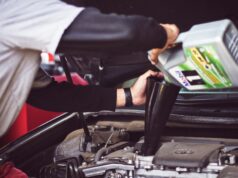 Nathaniel Peat is a man of many talents and achievements. His most compelling trait seems to be his dedication to help young people not just rise above crime, but to make a positive difference in their own lives as well as others in their community. His organization www.TheSafetyBox.org, seeks to do just that.
Nathaniel Peat is a man of many talents and achievements. His most compelling trait seems to be his dedication to help young people not just rise above crime, but to make a positive difference in their own lives as well as others in their community. His organization www.TheSafetyBox.org, seeks to do just that.
Briefly tell our readers exactly what The Safety Box is…
The Safety Box is literally what it means – everything inside the box is designed to help keep young people safe mentally, physically and spiritually. Specifically, it was designed to proactively address the growing concerns of anti-social behaviour, low self-esteem, gun and knife crime, alcohol and drugs misuse, bullying, sexual assault, harassment, negative black perceptions and youth wellbeing.
Inside the box we have a number of different life-skill based programmes, some ranging from a full year’s duration down to four weeks. Others include activity days and hour-long workshops.
If young people carry knives out of fear or for self-defence, where does the mentality of gangs of young people who instigate the violence, come from?
The mentality that originates and instigates violence comes from within. Everyone wants to feel powerful, appreciated and worth something. By being violent, it helps a lot of young people who have no direction in their lives exert their authority on others and gives them power. This inner inclination is further propagated through various violent computer games, films, music and the warped idea that being bad is somehow good.
Is there a portion of any of your organization’s programmes that helps to rebuild the confidence of surviving victims of violent crime? How does it work?
Yes, we normally encourage them to become staff members. So far, we have three victims of crime that now work for The Safety Box. There is a deep-rooted mental aspect to the rebuilding of victims’ confidence and a level of strong empowerment that really assists in taking them to a new understanding about themselves and others.
Working as staff acts as a strong healer on their outlook on life.
The Safety Box programs include self-defence aspects like how to defend against a knife attack. What advice or defence skills do you give participants if they ever face becoming a potential victim of a gun crime?
The advice I give is to avoid weapons at all costs. However, if faced with a gun, you should run at an angle away from the weapon on the outside of the hand gripping the weapon. Even a sharp shooter would find it extremely difficult to hit a moving target running at an angle away from the line of fire. Defence is not the solution; it just gives you a 70% better chance than if you do not defend.
You have received words of praise by no less than the PM himself. Has the government taken a more active interest in being involved or helping promote The Safety Box?
We have received no help from the government in what we do. They listen and they hear, but they don’t do anything. It’s down to us to make a difference.
How can our readers become more involved in The Safety Box and what do you ultimately want to see happen over the next five years with your organization?
We need sponsors; volunteers, helpers, event managers, youth workers, music teachers and sports specialists, and most importantly, we need readers to help get our message out. We want to get into more schools so that we can affect greater change. The more young people we can help the better it would be in the long run. I would like some of our Safety Box modules to be included in the National Curriculum.
We also hope to pull big businesses into the community and sponsor schools by providing mentors, running various work-related apprenticeship schemes and also pay for programmes to be run in areas of high crime.
To find out information on any of the programmes listed here, log onto www.TheSafetyBox.org













